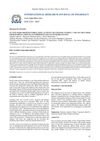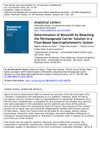 August 2024 in “Cosmetics”
August 2024 in “Cosmetics” Caffeine is beneficial for skin and hair treatments but needs better delivery methods to penetrate deeper skin layers.
[object Object]  June 2024 in “Majallah-i dānishgāh-i ̒ulum-i pizishkī-i Kirmān.”
June 2024 in “Majallah-i dānishgāh-i ̒ulum-i pizishkī-i Kirmān.” Eucalyptus and Tween 80 most effectively increase cetirizine skin absorption.
 June 2024 in “Molecules/Molecules online/Molecules annual”
June 2024 in “Molecules/Molecules online/Molecules annual” Platycladus orientalis flavonoids protect balding hair from UV damage and slow hair color change.
May 2024 in “Molecules/Molecules online/Molecules annual” Plant extracts can help prevent hair loss and promote hair growth.
 May 2024 in “Journal of medicinal food”
May 2024 in “Journal of medicinal food” Jojoba oil has many uses beyond skincare, including health benefits and pharmaceutical applications.
April 2024 in “International journal of molecular sciences” Combination pharmacotherapy is generally more effective for treating keloids and hypertrophic scars.
 April 2024 in “Bioactive materials”
April 2024 in “Bioactive materials” New microneedle treatment with growth factors and a hair loss drug shows better and faster hair growth results than current treatments.
April 2024 in “Cosmetics” Microneedling improves skin and hair conditions by enhancing treatment absorption and stimulating growth factors.
 March 2024 in “International Journal of Cosmetic Science”
March 2024 in “International Journal of Cosmetic Science” Dandruff is linked to increased T cells and weakened immune protection in hair follicles.
 March 2024 in “Bioactive Materials”
March 2024 in “Bioactive Materials” New treatment using engineered nanovesicles in hydrogel improves hair growth by repairing hair follicle cells in a mouse model of hair loss.
 February 2024 in “ACS Omega”
February 2024 in “ACS Omega” The Shen Bai Hair Growing Decoction may help treat hair loss by promoting hair growth and reducing inflammation.
 January 2024 in “Journal of lipid research”
January 2024 in “Journal of lipid research” Finasteride may lower cholesterol and slow heart disease progression.
 January 2024 in “Frontiers in Bioengineering and Biotechnology”
January 2024 in “Frontiers in Bioengineering and Biotechnology” A new method using stem cell membranes to deliver Minoxidil improved hair growth in mice better than Minoxidil alone.
 January 2024 in “Biotechnology advances”
January 2024 in “Biotechnology advances” Bioassays help find useful compounds in nature for making medicines, supplements, and cosmetics.

Solanum nigrum may help treat hair loss.
December 2023 in “Pharmaceutics” The new adhesive nanoparticles are effective for delivering Minoxidil to the scalp without skin irritation.
 November 2023 in “ACS Omega”
November 2023 in “ACS Omega” New liposome treatment successfully delivers CRISPR to deactivate a key enzyme in androgen-related disorders.

Nanocarriers with plant extracts show promise for safe and effective hair growth treatment.
 August 2023 in “Journal of Cosmetic Dermatology”
August 2023 in “Journal of Cosmetic Dermatology” Exosomes from hair papilla cells and the Chinese medicine Liao Tuo Fang can potentially promote hair growth and could be used to develop hair growth drugs.

Plant-based compounds can improve wound dressings and skin medication delivery.
 July 2023 in “International Journal of Cosmetic Science”
July 2023 in “International Journal of Cosmetic Science” Biopolymers are increasingly used in cosmetics for their non-toxicity and skin benefits, with future biotech advancements likely to expand their applications.
 December 2022 in “Frontiers in Pharmacology”
December 2022 in “Frontiers in Pharmacology” Tianma Gouteng decoction may help prevent hair loss and promote hair growth.
December 2022 in “Molecular Pharmaceutics” Latanoprost-loaded nanotransfersomes could help treat hair loss by promoting hair growth.
January 2022 in “Springer eBooks” [object Object] 467 citations,
May 1999 in “Molecular Cell” Activating c-Myc in skin causes rapid cell growth and changes, but these effects are reversible.
 54 citations,
November 2017 in “Scientific Reports”
54 citations,
November 2017 in “Scientific Reports” The study found that certain microRNAs are higher in the cells and lower in the fluid of women with a specific type of polycystic ovary syndrome, and one microRNA could potentially help diagnose the condition.
 2 citations,
August 2019 in “BMC Complementary and Alternative Medicine”
2 citations,
August 2019 in “BMC Complementary and Alternative Medicine” Asiasari radix extract may be a potential treatment for melanoma because it selectively triggers cell death in melanoma cells by affecting p53 regulation.
 1 citations,
October 2018 in “International research journal of pharmacy”
1 citations,
October 2018 in “International research journal of pharmacy” Rampai leaves extract can significantly stimulate hair growth.
 December 2022 in “Proceeding Bengkulu International Conference on Health”
December 2022 in “Proceeding Bengkulu International Conference on Health” Celery extract hair gel at 5% concentration is best for making hair gel.
 4 citations,
January 2011 in “Analytical Letters”
4 citations,
January 2011 in “Analytical Letters” The method quickly and accurately measures minoxidil in drugs, comparable to standard techniques.























